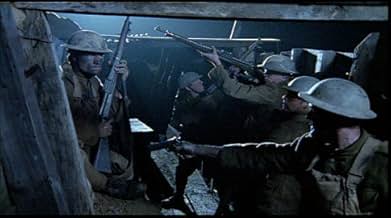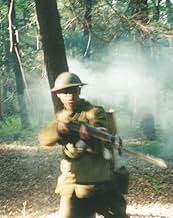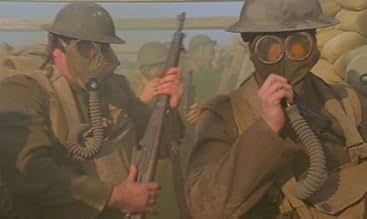Ajouter une intrigue dans votre langueWorld War I troubled veteran Joe Delaney attempts to compile a history of his U.S. Marines company but nightmares about the German soldier he killed haunt him still.World War I troubled veteran Joe Delaney attempts to compile a history of his U.S. Marines company but nightmares about the German soldier he killed haunt him still.World War I troubled veteran Joe Delaney attempts to compile a history of his U.S. Marines company but nightmares about the German soldier he killed haunt him still.
- Réalisation
- Scénario
- Casting principal
Avis à la une
I almost wrote this review before I saw the movie . . Something along the lines of " Oh dear trust Uncle Sam to make a film on how they turned up to save the Limeys in World War One etc etc " What I should have done is remember the old phrase " Never assume anything because it makes an ass out of you and me " . That said it does suffer from the low budget independent film look and feel and watching the early scenes you'd be totally forgiven for thinking this was a dreary TVM . It's painfully obvious the budget didn't stretch to filming somewhere , anywhere that might resemble the Western Front in 1917-18 where a few short years of war had turned the landscape in to something resembling a muddy version of the surface of the Moon . This has led to some people on this page to dismiss COMPANY K out of hand . If you're expecting epic battle scenes then this isn't the film for you but does manage to make anti-war statements better than a lot of films with ten times the budget
I've never read the book and some people might suggest that the film suffers from sticking too rigidly to the book with its episodic nature and its character-centric vignettes but I disagree . All too often in war films the characters are hidden behind uniforms and helmets and it's difficult to keep track of who is who hence we get movies like THE LONGEST DAY and THE THIN RED LINE where a host of household names appear in cameos simply to remind the audience who the character is . The storytelling technique of COMPANY K negates the need for a big name cast and the obvious use of exposition pointing out who the character is , we're introduced to the m instantly via on screen caption and his works very well . It might not be subtle but this isn't a subtle film and deals with the usual war is hell , something it never hints at in the opening . Let me just repeat that the opening scenes give the impression you're going to be watching an anti-septic PG certificate made for television production which isn't what happens . It's not explicit war porn either but concentrates of the psychological horrors of war and was actually quite shocked at some of the on screen happenings carried out by the US Marine Corps . In war movies Americans are always the good guys and behave exemplary no matter the provocations no matter what and they're always real men untouched by any horror but not in this movie . Finally a word on the musical score by Craig McConnell and Donald Stark which can be criticised as being on one hand intrusive and manipulative but is very effective and atmospheric
I've never read the book and some people might suggest that the film suffers from sticking too rigidly to the book with its episodic nature and its character-centric vignettes but I disagree . All too often in war films the characters are hidden behind uniforms and helmets and it's difficult to keep track of who is who hence we get movies like THE LONGEST DAY and THE THIN RED LINE where a host of household names appear in cameos simply to remind the audience who the character is . The storytelling technique of COMPANY K negates the need for a big name cast and the obvious use of exposition pointing out who the character is , we're introduced to the m instantly via on screen caption and his works very well . It might not be subtle but this isn't a subtle film and deals with the usual war is hell , something it never hints at in the opening . Let me just repeat that the opening scenes give the impression you're going to be watching an anti-septic PG certificate made for television production which isn't what happens . It's not explicit war porn either but concentrates of the psychological horrors of war and was actually quite shocked at some of the on screen happenings carried out by the US Marine Corps . In war movies Americans are always the good guys and behave exemplary no matter the provocations no matter what and they're always real men untouched by any horror but not in this movie . Finally a word on the musical score by Craig McConnell and Donald Stark which can be criticised as being on one hand intrusive and manipulative but is very effective and atmospheric
For this movie, my recommendation is to read the book. I have not, and do not discount the power which may have been conveyed by the original author who lived the experiences.
But all credibility which this movie may have had, washed away for me because there was no dirt, no mud, no decay, no rats, no lice, no corpse stink, no depiction of the truly terrible conditions in which these people fought and slogged and died.
All of the soldiers' kit was unblemished, unstained, unmuddied, looking like the producer did not want to risk the expense of getting it cleaned upon its return to the props department. The trenches looked like they had been built that afternoon.
You want to tell an effective story with pictures, you have to make the pictures right, or the story doesn't get told.
Go watch "All Quiet On The Western Front" for the quintessential depiction of World War I.
But all credibility which this movie may have had, washed away for me because there was no dirt, no mud, no decay, no rats, no lice, no corpse stink, no depiction of the truly terrible conditions in which these people fought and slogged and died.
All of the soldiers' kit was unblemished, unstained, unmuddied, looking like the producer did not want to risk the expense of getting it cleaned upon its return to the props department. The trenches looked like they had been built that afternoon.
You want to tell an effective story with pictures, you have to make the pictures right, or the story doesn't get told.
Go watch "All Quiet On The Western Front" for the quintessential depiction of World War I.
Company K by Robert Clem is a serious work that should be seen, and, more importantly, re-seen.
The film begins with a quotation from William March's autobiographical World War I novel of the same name, but it could have begun with the quotation from Erich Maria Remarque's novel, All Quiet on the Western Front: "This book is neither an accusation nor a confession. It will simply tell of a generation of men who, even though they may have escaped its shells, were destroyed by the war." There are differences. Remarque's book was about German soldiers, whereas Company K is about American soldiers. And Company K is more of an accusation and a confession, although the film has an overall documentary feel.
The plot is a string of episodes, each focusing on a key experience of a different soldier in the unit. The structure follows March's plan for his book where each story is placed on a wheel and the wheel spun "in an unending circle of pain." Some viewers might find this narrative structure too unusual because there isn't really a high climax. The end of the war is simply a brief episode bridging to the postwar traumas of Private Joe Delaney (March) and others. This anticlimactic episode is handled subtly: The soldiers don't jump up and throw their helmets in the air; they sigh, stare dumbly, and drop their helmets to the ground.
Many other episodes have similar ironic strength. A country soldier who has never seen an airplane exclaims one's approach; he is strafed. Inexperienced officers talk Ivy League politics but make battlefield blunders; one attempts suicide and another is murdered by an exhausted enlisted man. Two soldiers with grumbling stomachs eat blood-soaked enemy pumpernickel. An experienced French prostitute admits that she had promised to save herself for her boyfriend until he was killed early in the war.
In a prologue scene before the opening credits, Delaney tells his wife of his book about the war. She advises him to leave out the part about murdering a group of German prisoners. It's a well-chosen prologue -- the events surrounding that episode and its aftermath are the film's most powerful.
The young actors are excellent and perform with conviction. Dialog is well written and delivered. The authenticity of uniforms, weapons, vehicles, and battlefield locations is impressive. There is no cast of a thousand extras, but the judicious use of actual WWI footage expands the scope some.
Company K is one of those few films that get better with re-seeing. Fresh nuances appear each time wiping blood off bayonets, soldiers crossing themselves as shells falls on friends, battle-fatigued faces and the effect grows. This film ought to be studied alongside the novel in college courses.
The film begins with a quotation from William March's autobiographical World War I novel of the same name, but it could have begun with the quotation from Erich Maria Remarque's novel, All Quiet on the Western Front: "This book is neither an accusation nor a confession. It will simply tell of a generation of men who, even though they may have escaped its shells, were destroyed by the war." There are differences. Remarque's book was about German soldiers, whereas Company K is about American soldiers. And Company K is more of an accusation and a confession, although the film has an overall documentary feel.
The plot is a string of episodes, each focusing on a key experience of a different soldier in the unit. The structure follows March's plan for his book where each story is placed on a wheel and the wheel spun "in an unending circle of pain." Some viewers might find this narrative structure too unusual because there isn't really a high climax. The end of the war is simply a brief episode bridging to the postwar traumas of Private Joe Delaney (March) and others. This anticlimactic episode is handled subtly: The soldiers don't jump up and throw their helmets in the air; they sigh, stare dumbly, and drop their helmets to the ground.
Many other episodes have similar ironic strength. A country soldier who has never seen an airplane exclaims one's approach; he is strafed. Inexperienced officers talk Ivy League politics but make battlefield blunders; one attempts suicide and another is murdered by an exhausted enlisted man. Two soldiers with grumbling stomachs eat blood-soaked enemy pumpernickel. An experienced French prostitute admits that she had promised to save herself for her boyfriend until he was killed early in the war.
In a prologue scene before the opening credits, Delaney tells his wife of his book about the war. She advises him to leave out the part about murdering a group of German prisoners. It's a well-chosen prologue -- the events surrounding that episode and its aftermath are the film's most powerful.
The young actors are excellent and perform with conviction. Dialog is well written and delivered. The authenticity of uniforms, weapons, vehicles, and battlefield locations is impressive. There is no cast of a thousand extras, but the judicious use of actual WWI footage expands the scope some.
Company K is one of those few films that get better with re-seeing. Fresh nuances appear each time wiping blood off bayonets, soldiers crossing themselves as shells falls on friends, battle-fatigued faces and the effect grows. This film ought to be studied alongside the novel in college courses.
The old National Guard ad used to say, "It's not just a job, it's an adventure!" Robert Clem's adaptation of William March's book of the same title retains the overall humanity of men in combat but is clear to dispel any myth of glorious combat action. Service men and women will enjoy this film for its accuracy and will relate to the characters and their experiences. The book is a timeless classic. Robert Clem has done a masterful job of portraying the story for us to enjoy and learn from.
This film is a timeless examination of how combat affects men and their lives after the combat is over. As an officer in the U.S. Army myself, I recognize and relate to the characters and their experiences. There are genuine events portrayed that have been repeated time-after-time since William March wrote his book. As a primer for the military, this could help leaders to identify when their subordinates are facing moral dilemmas perhaps at the cost of their own life. It will help the first line combatants to remember to remain vigilant or suffer the consequences of inattentiveness. It will also help the general public to understand a bit more what is involved with service in the military.
Certainly there is a close camaraderie demonstrated in the film among the fighting Marines. That camaraderie is present today too. Those men struggled upon their return home when their close knit organization was no longer around to provide support (positive or negative). Today's veteran also all-too-often returns home facing a public that really doesn't understand or is often unwilling to accept the fact that waging war is not simply a job.
Today's U.S. Military is all volunteer and most personnel re-enlist themselves to defend the ideals of freedom defined in the U.S. Constitution. The military and society are partners receiving mutual benefit in turn for that service. I think this film is clear on long-term effects from combat.
I appreciate Mr. Clem's attention to detail and accuracy in creating this film. His adaptation is a poignant work of craftsmanship. I highly recommend this film.
This film is a timeless examination of how combat affects men and their lives after the combat is over. As an officer in the U.S. Army myself, I recognize and relate to the characters and their experiences. There are genuine events portrayed that have been repeated time-after-time since William March wrote his book. As a primer for the military, this could help leaders to identify when their subordinates are facing moral dilemmas perhaps at the cost of their own life. It will help the first line combatants to remember to remain vigilant or suffer the consequences of inattentiveness. It will also help the general public to understand a bit more what is involved with service in the military.
Certainly there is a close camaraderie demonstrated in the film among the fighting Marines. That camaraderie is present today too. Those men struggled upon their return home when their close knit organization was no longer around to provide support (positive or negative). Today's veteran also all-too-often returns home facing a public that really doesn't understand or is often unwilling to accept the fact that waging war is not simply a job.
Today's U.S. Military is all volunteer and most personnel re-enlist themselves to defend the ideals of freedom defined in the U.S. Constitution. The military and society are partners receiving mutual benefit in turn for that service. I think this film is clear on long-term effects from combat.
I appreciate Mr. Clem's attention to detail and accuracy in creating this film. His adaptation is a poignant work of craftsmanship. I highly recommend this film.
OK i have to get this off my chest first of all to the people saying its the greatest war movie ever made. the movie itself i felt was poorly made. mostly because of the bad acting. the acting is pretty bad even for a Indi film. but besides the acting being bad it really isn't that bad of a movie. there's lots of action, the story is easy to follow, and the characters are even likable which is surprising by their acting. another plus is that it is a World War 1 movie. you hardly ever get to see or even hear about World War 1. this movie definitely got what war can do to a person mentally. this movie also is good for accuracy. overall if you can overlook the bad acting this is still a really good movie.
Meilleurs choix
Connectez-vous pour évaluer et suivre la liste de favoris afin de recevoir des recommandations personnalisées
Détails
Contribuer à cette page
Suggérer une modification ou ajouter du contenu manquant






























